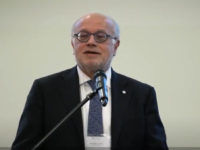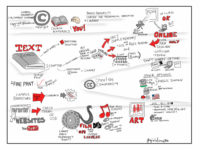The role of the public and the public interest has factored prominently into many of the Law Bytes podcast conversations. For the 100th episode, Osgoode Hall Law School Professor David Vaver, widely viewed as Canada’s leading IP expert, joins the podcast. The recipient of the Order of Canada, Professor Vaver provided the scholarly grounding for the emergence of user rights in copyright in Canada and around the world. In this episode, he gives a masterclass on the history of copyright, the emergence of user rights, Supreme Court copyright jurisprudence, and potential future copyright reforms.
Post Tagged with: "york"
Same Old Spin: Why Access Copyright Needs a Reality Check on Canadian Copyright
Last week’s Supreme Court of Canada copyright decision in Access Copyright v. York University has unsurprisingly been applauded by the education community, which having faced years of litigation launched by the copyright collective, now finds its position vindicated. With the court resoundingly rejecting Access Copyright’s claims that its tariff is mandatory, finding that it had no standing to file a lawsuit for copyright infringement on behalf of its members, and concluding that a lower court fair dealing analysis that favoured the copyright collective was tainted with “a fairness assessment that was over before it began”, there is little doubt about which party prevailed. Yet Access Copyright has returned to its longstanding playbook of downplaying Supreme Court decisions and misleading its own members in the process.
Copyright Vindication: Supreme Court Confirms Access Copyright Tariff Not Mandatory, Lower Court Fair Dealing Analysis Was “Tainted”
The Supreme Court of Canada brought a lengthy legal battle between Access Copyright and York University to an end last week, issuing a unanimous verdict written by retiring Justice Rosalie Abella that resoundingly rejected the copyright collective’s claims that its tariff is mandatory, finding that it had no standing to file a lawsuit for copyright infringement on behalf of its members, and concluding that a lower court fair dealing analysis that favoured Access Copyright was tainted with “a fairness assessment that was over before it began.” The decision removes any doubt that the Supreme Court remains strongly supportive of user’s rights in copyright and vindicates years of educational policy in shifting away from Access Copyright toward alternative means of ensuring compliance with copyright law.
Federal Court of Appeal Deals Access Copyright Huge Blow As It Overturns York University Copyright Decision
The Federal Court of Appeal delivered its long-awaited decision the York University v. Access Copyright case yesterday, setting aside the lower court ruling that I had described as “a complete victory” for Access Copyright. The latest ruling will not leave York University and the education community completely happy given the court’s fair dealing analysis, but winning on the mandatory tariff issue removes both the threat of mandated payments to Access Copyright as well as the possibility of a copyright infringement lawsuit by the copyright collective. That represents an enormous win both for York and for a fair approach to copyright licensing that ensures users have licensing choice.
Why Fair Dealing is Not Destroying Canadian Publishing
While the copyright world waits for the likely appeal of the Access Copyright v. York University federal court decision (my post on the fair dealing legal errors, Ariel Katz on tariff legal errors), Canadian universities have begun to respond to the decision with many remaining committed to a reasonable policy based on licensing, open access, and fair dealing. Rather than a free-for-all, these approaches include spending hundreds of millions of dollars for access to thousands of copyright works.
This week, Intellectual Property Watch posted a longer piece of mine based on several recent posts and articles. It digs into the data, unpacking the realities behind revenues, guidelines, licensing, and emerging alternatives. The post begins:











